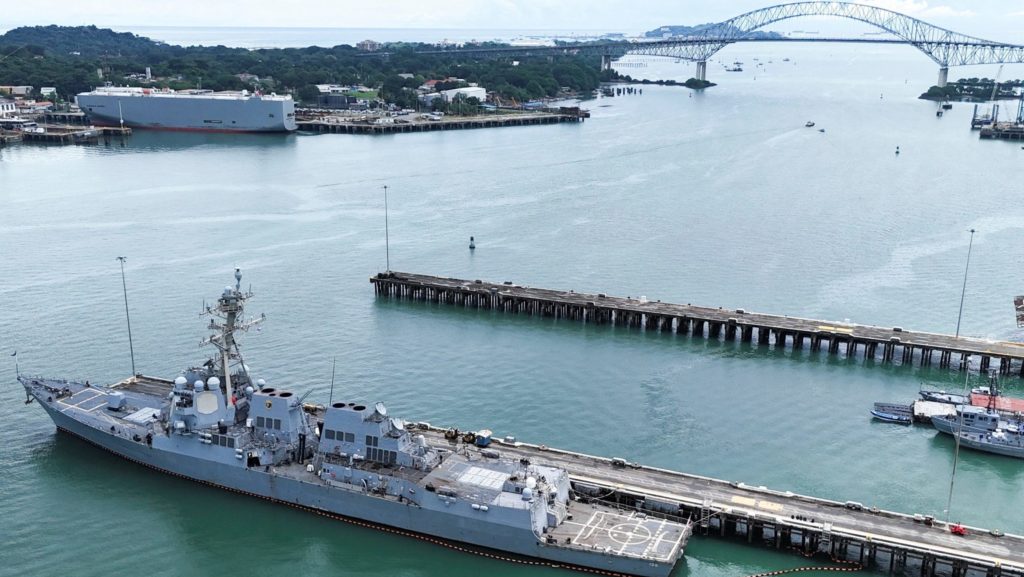As the U.S. military carried out another strike on Oct. 16 against what it said was a suspected drug vessel in the Caribbean, a Notre Dame Law School expert warned that type of action, without authorization from Congress, could set the stage for the government to conduct strikes closer to home with virtually no guardrails.
First reported by Reuters, the Oct. 16 strike is believed to be the first in a series of such strikes that left survivors among the crew. At least six strikes have taken place. Sources told The Associated Press the survivors of the most recent strike are in U.S. custody.
Previously, President Donald Trump announced another strike on an alleged drug-trafficking boat in the Caribbean on Oct. 14 that the U.S. carried out in the waters off the coast of Venezuela, killing six people, in what it characterized as an effort to prevent drug trafficking into the U.S. Close to 30 people have been killed in such strikes in the Caribbean.
Mary Ellen O'Connell, a professor at Notre Dame Law School who specializes in international law and conflict resolution, expressed concern that Trump "played a critical role in winning a ceasefire in Gaza only to turn around to use lawless military force in the Caribbean."
"In the weeks since the first U.S. Navy attack on a small boat, no credible facts or legal principles have come to light to justify these attacks," she said in written comments. "If the President wants to succeed in the Middle East, he needs to start modeling law compliance."
In an Oct. 14 social media post shared by Trump and Secretary of Defense Pete Hegseth—who uses the moniker "secretary of war" since Trump signed an executive order on Sept. 5 adding the "Department of War" as a secondary, ceremonial title for the Department of Defense—the president said, "Under my Standing Authorities as Commander-in-Chief, this morning, the Secretary of War, ordered a lethal kinetic strike on a vessel affiliated with a Designated Terrorist Organization (DTO) conducting narcotrafficking in the USSOUTHCOM area of responsibility—just off the Coast of Venezuela."
"Intelligence confirmed the vessel was trafficking narcotics, was associated with illicit narcoterrorist networks, and was transiting along a known DTO route," Trump said. "The strike was conducted in International Waters, and six male narcoterrorists aboard the vessel were killed in the strike. No U.S. Forces were harmed. Thank you for your attention to this matter!!!!!!"
On Jan. 20, Trump issued an executive order designating certain international cartels and other transnational organizations that also operate within the U.S., such as MS-13 and Tren de Aragua gangs, as "foreign terrorist organizations." Trump noted the government's policy was " to ensure the total elimination of these organizations' presence in the United States and their ability to threaten the territory, safety, and security of the United States." In August, the Trump administration signaled it would use the military to carry out this policy.
The Trump administration has also authorized the CIA to conduct covert action in Venezuela, The New York Times reported.
The Catechism of the Catholic Church states legitimate authorities are entrusted with preserving the common good by "rendering the unjust aggressor unable to inflict harm," and toward that end they "have the right to repel by armed force aggressors against the civil community entrusted to their charge."
The church's doctrine also stipulates that legitimate defense by military force is only morally permissible under strict conditions that are all present at one and the same time: the "lasting, grave and certain" damage from the aggressor, the exhaustion of all other efforts to end such damage, "serious prospects of success," and the use of arms such that graver evils and disorders are not produced.
Some have questioned what legal authority the U.S. had to carry out the strike under either U.S. or international law.
Sen. Jeanne Shaheen, D-N.H., ranking member of the Senate Foreign Relations Committee, said in an Oct. 15 statement, "I support cracking down on the cartels and traffickers. But the Trump Administration's authorization of covert C.I.A. action, conducting lethal strikes on boats and hinting at land operations in Venezuela slides the United States closer to outright conflict with no transparency, oversight or apparent guardrails."
"The American people deserve to know if the Administration is leading the U.S. into another conflict, putting servicemembers at risk or pursuing a regime-change operation," Shaheen said.
O'Connell argued, "The only relevant law for peace is international law–that is the law of treaties, human rights and statehood."
"It is the law that prohibits the unlawful use of force. Peace and prosperity are dependent on this law," she said. "It is being cast aside every time the president orders a lawless killing."
"Americans should be concerned about this unfettered exercise of lawlessness. It is the Caribbean today. It could be Lake Michigan tomorrow," O'Connell said, referring to one of the Great Lakes that is both within U.S. territory and accessible to ships and boats from Canada. She added, "Nothing in the president's executive order excludes that possibility."

